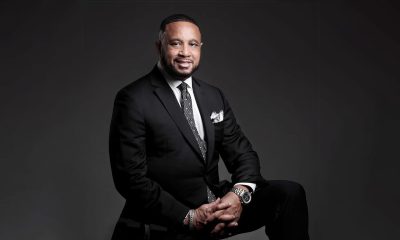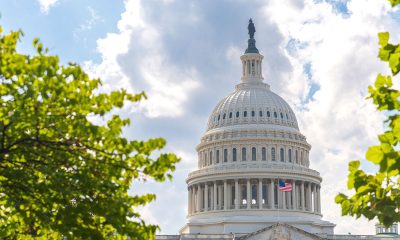#NNPA BlackPress
Dr. Michael Lomax and the UNCF Continue to Champion HBCUs
NNPA NEWSWIRE — UNCF awards more than $100 million in scholarships annually and administers more than 400 programs, including scholarship, internship and fellowship, mentoring, summer enrichment, and curriculum and faculty development programs.
By Stacy M. Brown, NNPA Newswire Correspondent
@StacyBrownMedia
For 75 years, the United Negro College Fund has been lighting the way to better futures for young people and leaving little doubt to the importance of its catchy but all-too serious slogan: “A mind is a terrible thing to waste.”
And, for more than 14 years, no one has championed the cause of a good education for African Americans and other underserved students better than Dr. Michael Lomax, the president and CEO of UNCF, which counts as the country’s largest provider of scholarships and other educational support for students of African descent.
“Many [African American students] are choosing historically Black colleges and universities (HBCUs),” Lomax said this week after hosting a luncheon where he helped to deliver a State of HBCUs address.
“HBCUs have more enrollment today than in the era of segregation. We had a decline in enrollment of about 10 percent because of the Parents Plus loan fiasco in 2012, but enrollments are growing,” Lomax said.
A large number of African American millennials are applying to HBCUs but many are finding that they can’t afford to attend without the benefit of more scholarships and grants, he said.
“That’s why we’ve called on Congress to double the Pell Grant, not just for HBCUs, but for all private institutions which are endangered species in this country,” Lomax said.
Since its founding, UNCF has raised more than $4.8 billion and has helped at least 450,000 students earn degrees at UNCF-member HBCUs.
With 37 member colleges and universities, the UNCF also advocates for the importance of minority education and college readiness.
Lomax pointed out that UNCF institutions and HBCUs remain highly effective, awarding nearly 20 percent of African American baccalaureate degrees.
UNCF awards more than $100 million in scholarships annually and administers more than 400 programs, including scholarship, internship and fellowship, mentoring, summer enrichment, and curriculum and faculty development programs.
Currently, UNCF supports more than 60,000 students at more than 1,100 colleges and universities across the country.
“There are more small white colleges that are being threatened with closure and shutting down and a member at Harvard University has predicted that half of all private colleges will be closed over the next decade,” Lomax said.
“These are all part of the higher education landscape in this country. We’re going to fight for ours and we’re going to join these other institutions who are modestly resourced and we are going to fight,” he said.
It’s that same spirit that led UNCF and many others to respond when the historically black and all-girls Bennett College was given just 60 days to raise $5 million in an attempt to keep its accreditation.
“There are 95 standards [the Southern Association of Colleges and Schools) hold its institutions to and they include education programs and faculty requirements. Bennet had 94,” Lomax said.
“They missed one and the one they missed was the standard on finances and even when they did what they were directed to and out-did it, [the association] still withdrew accreditation,” he said.
Lomax continued:
“I consider that to be biased and inequitable and I’ve called on Congress to intervene. We’re in court. We’re not going to allow Bennett to be destroyed because the actions taken are actions to destroy Bennett and it’s inappropriate, biased and unfair and we will fight it and we stand with Bennett.”
Fighting for Bennett is of little surprise as UNCF continues to press its vision of a nation where all have equal access to a college education that prepares them for rich intelligent lives, competitive and fulfilling careers, engaged citizenship and service to the nation.
One of UNCF’s primary objectives is to increase the total number of African American college graduates by focusing on activities that ensure more students are college-ready, enroll in college and persist to graduation.
That mission includes helping to eradicate much of – if not all – student debt.
“Student loan debt is an enormous financial and psychological toll on students. We must invest in students and keep them from being in the red,” Lomax said.
An alumnus of an HBCU (Morehouse College graduate), Lomax formerly served as president of Dillard University in New Orleans and he worked as a literature professor at UNCF-member institutions Morehouse and Spelman colleges.
The founder of the National Black Arts Festival, Lomax also served as chairman of the Fulton County Commission in Atlanta, the first African American elected to that post.
“I have seen first-hand that HBCUs produce outsized results for first-generation, low-income students of color, and do so with no-frills budgets,” Lomax said.
And, when he hears from critics that HBCUs are no longer relevant, Lomax provides the perfect response.
“Virtually no researchers have sought to comprehensively assess the modern-day economic impact of HBCUs,” he said.
Under Lomax, the UNCF has done exactly that.
The latest researched revealed the total economic impact of HBCU spending stands at $14.8 billion annually while those institutions generate 134,090 jobs for their local and regional economies.
Further, the total lifetime earnings for graduates exceeds $130 billion.
The positive economic impact of HBCUs demonstrates that those institutions are economic engines in their communities, generating substantial financial returns year after year,” Lomax said.
It’s also why he’s called on Congress for the following:
Increase Title III Part B funding in the amount of $100 million to enable HBCUs to use funding to meet the needs of their institutions:
- Extend annual mandatory funding of $85 million for a decade for the Strengthening HBCUs Program, an initiative to increase the number of minorities in science, technology, engineering and mathematics (STEM);
- Appropriate $1 billion for HBCU’s infrastructure to preserve and upgrade the historic institutions, improve technology and expand capacity;
- Double the Pell Grant award for students to pursue their degrees without burdensome or crippling student loan debt;
- Review the procedures and decisions of higher education regional accreditors to offset the “harsh, seemingly disparate [and] too often existential punishing sanctions handed out to historically Black colleges and universities,” Lomax said.
“Among the many contributions that HBCUs have made to this country, HBCUs are the engines that help power and deliver much-needed economic and workforce diversity,” he said.
“By that standard alone, our institutions are worth the federal investment we are asking for.”
#NNPA BlackPress
A Nation in Freefall While the Powerful Feast: Trump Calls Affordability a ‘Con Job’
BLACKPRESSUSA NEWSWIRE — There are seasons in this country when the struggle of ordinary Americans is not merely a condition but a kind of weather that settles over everything.

By Stacy M. Brown
Black Press USA Senior National Correspondent
There are seasons in this country when the struggle of ordinary Americans is not merely a condition but a kind of weather that settles over everything. It enters the grocery aisle, the overdue bill, the rent notice, and the long nights spent calculating how to get through the next week. The latest numbers show that this season has not passed. It has deepened.
Private employers cut 32,000 jobs in November, according to ADP. Because the nation has been hemorrhaging jobs since President Trump took office, the administration has halted publishing the traditional monthly report. The ADP report revealed that small businesses suffered the heaviest losses. Establishments with fewer than 50 workers shed 120,000 positions, including 74,000 from companies with 20 to 49 workers. Larger firms added 90,000 jobs, widening the split between those rising and those falling.
Meanwhile, wealth continues to climb for the few who already possess most of it. Federal Reserve data shows the top 1 percent now holds $52 trillion. The top 10 percent added $5 trillion in the second quarter alone. The bottom half gained only 6 percent over the past year, a number so small it fades beside the towering fortunes above it.
“Less educated and poorer people tend to make worse mistakes,” John Campbell said to CBS News, while noting that the complexity of the system leaves many families lost before they even begin. Campbell, a Harvard University economist and coauthor of a book examining the country’s broken personal finance structure, pointed to a system built to confuse and punish those who lack time, training, or access.
“Creditors are just breathing down their necks,” Carol Fox told Bloomberg News, while noting that rising borrowing costs, shrinking consumer spending, and trade battles under the current administration have left owners desperate. Fox serves as a court-appointed Subchapter V trustee in Southern Florida and has watched the crisis unfold case by case.
During a cabinet meeting on Tuesday, Trump told those present that affordability “doesn’t mean anything to anybody.” He added that Democrats created a “con job” to mislead the public.
However, more than $30 million in taxpayer funds reportedly have supported his golf travel. Reports show Kristi Noem and FBI Director Kash Patel have also made extensive use of private jets through government and political networks. The administration approved a $40 billion bailout of Argentina. The president’s wealthy donors recently gathered for a dinner celebrating his planned $300 million White House ballroom.
During an appearance on CNBC, Mark Zandi, an economist, warned that the country could face serious economic threats. “We have learned that people make many mistakes,” Campbell added. “And particularly, sadly, less educated and poorer people tend to make worse mistakes.”
#NNPA BlackPress
The Numbers Behind the Myth of the Hundred Million Dollar Contract
BLACKPRESSUSA NEWSWIRE — Odell Beckham Jr. did not spark controversy on purpose. He sat on The Pivot Podcast and tried to explain the math behind a deal that looks limitless from the outside but shrinks fast once the system takes its cut.

By Stacy M. Brown
Black Press USA Senior National Correspondent
Odell Beckham Jr. did not spark controversy on purpose. He sat on The Pivot Podcast and tried to explain the math behind a deal that looks limitless from the outside but shrinks fast once the system takes its cut. He looked into the camera and tried to offer a truth most fans never hear. “You give somebody a five-year $100 million contract, right? What is it really? It is five years for sixty. You are getting taxed. Do the math. That is twelve million a year that you have to spend, use, save, invest, flaunt,” said Beckham. He added that buying a car, buying his mother a house, and covering the costs of life all chip away at what people assume lasts forever.
The reaction was instant. Many heard entitlement. Many heard a millionaire complaining. What they missed was a glimpse into a professional world built on big numbers up front and a quiet erasing of those numbers behind the scenes.
The tax data in Beckham’s world is not speculation. SmartAsset’s research shows that top NFL players often lose close to half their income to federal taxes, state taxes, and local taxes. The analysis explains that athletes in California face a state rate of 13.3 percent and that players are also taxed in every state where they play road games, a structure widely known as the jock tax. For many players, that means filing up to ten separate returns and facing a combined tax burden that reaches or exceeds 50 percent.
A look across the league paints the same picture. The research lists star players in New York, Philadelphia, Chicago, Detroit, and Cleveland, all giving up between 43 and 47 percent of their football income before they ever touch a dollar. Star quarterback Phillip Rivers, at one point, was projected to lose half of his playing income to taxes alone.
A second financial breakdown from MGO CPA shows that the problem does not only affect the highest earners. A $1 million salary falls to about $529,000 after federal taxes, state and city taxes, an agent fee, and a contract deduction. According to that analysis, professional athletes typically take home around half of their contract value, and that is before rent, meals, training, travel, and support obligations are counted.
The structure of professional sports contracts adds another layer. A study of major deals across MLB, the NBA, and the NFL notes that long-term agreements lose value over time because the dollar today has more power than the dollar paid in the future. Even the largest deals shrink once adjusted for time. The study explains that contract size alone does not guarantee financial success and that structure and timing play a crucial role in a player’s long-term outcomes.
Beckham has also faced headlines claiming he is “on the brink of bankruptcy despite earning over one hundred million” in his career. Those reports repeated his statement that “after taxes, it is only sixty million” and captured the disbelief from fans who could not understand how money at that level could ever tighten.
Other reactions lacked nuance. One article wrote that no one could relate to any struggle on eight million dollars a year. Another described his approach as “the definition of a new-money move” and argued that it signaled poor financial choices and inflated spending.
But the underlying truth reaches far beyond Beckham. Professional athletes enter sudden wealth without preparation. They carry the weight of family support. They navigate teams, agents, advisors, and expectations from every direction. Their earning window is brief. Their career can end in a moment. Their income is fragmented, taxed, and carved up before the public ever sees the real number.
The math is unflinching. Twenty million dollars becomes something closer to $8 million after federal taxes, state taxes, jock taxes, agent fees, training costs, and family responsibilities. Over five years, that is about $40 million of real, spendable income. It is transformative money, but not infinite. Not guaranteed. Not protected.
Beckham offered a question at the heart of this entire debate. “Can you make that last forever?”
#NNPA BlackPress
FBI Report Warns of Fear, Paralysis, And Political Turmoil Under Director Kash Patel
BLACKPRESSUSA NEWSWIRE — Six months into Kash Patel’s tenure as Director of the Federal Bureau of Investigation, a newly compiled internal report from a national alliance of retired and active-duty FBI agents and analysts delivers a stark warning about what the Bureau has become under his leadership.

Six months into Kash Patel’s tenure as Director of the Federal Bureau of Investigation, a newly compiled internal report from a national alliance of retired and active-duty FBI agents and analysts delivers a stark warning about what the Bureau has become under his leadership. The 115-page document, submitted to Congress this month, is built entirely on verified reporting from inside field offices across the country and paints a picture of an agency gripped by fear, divided by ideology, and drifting without direction.
The report’s authors write that they launched their inquiry after receiving troubling accounts from inside the Bureau only four months into Patel’s tenure. They describe their goal as a pulse check on whether the ninth FBI director was reforming the Bureau or destabilizing it. Their conclusion: the preliminary findings were discouraging.
Reports Describe Widespread Internal Distrust and Open Hostility Toward President Trump
Sources across the country told investigators that a large number of FBI employees openly express hostility toward President Donald Trump. One source reported seeing an “increasing number of FBI Special Agents who dislike the President,” adding that these employees were exhibiting what they called “TDS” and had lost “their ability to think critically about an issue and distinguish fact from fiction.” Another source described employees making off-color comments about the administration during office conversations.
The sentiment reportedly extends beyond domestic lines. Law enforcement and intelligence partners in allied countries have privately expressed fear that the Trump administration could damage long-term international cooperation according to a sub-source who reported those concerns directly to investigators.
Pardon Backlash and Fear of Retaliation
The President’s January 20 pardons of individuals convicted for their roles in the January 6 attack ignited what the report calls demoralization inside the Bureau. One FBI employee said they were “demoralized” that individuals “rightfully convicted” were pardoned and feared that some of those individuals or their supporters might target them or their family for carrying out their duties. Another source described widespread anger that lists of personnel who worked on January 6 investigations had been provided to the Justice Department for review, noting that agents “were just following orders” and now worry those lists could leak publicly.
Morale In Decline
Morale among FBI employees appears to be sinking fast. There were a few scattered positive notes, but the weight of the reporting describes morale as low, bad, or terrible. Agents with more than a decade of service told investigators they feel marginalized or ignored. Some are counting the days until they can retire. One even uses a countdown app on their phone.
Culture Of Fear
Layered over that unhappiness is something far more corrosive. A culture of fear. Sources say Patel, though personable, created mistrust from the start because of harsh remarks he made about the FBI before taking office. Agents took those comments personally. They now work in an atmosphere where employees keep their heads down and speak carefully. Managers wait for directions because they are afraid a wrong move could cost them their jobs. One source said agents dread coming to work because nobody knows who will be reassigned or fired next.
Leadership Concerns
The report also paints a picture of leaders unprepared for the jobs they hold. Multiple sources said Patel is in over his head and lacks the breadth of experience required to understand the Bureau’s complex programs. Some said Deputy Director Dan Bongino should never have been appointed because the role requires deep institutional knowledge of FBI operations. A sub-source recounted Bongino telling employees during a field office visit that “the truth is for chumps.” Employees who heard it were stunned and offended.
Social Media and Communication Breakdowns
Communication inside the Bureau has become another source of frustration. Sources said Patel and Bongino spend too much time posting on social media and not enough time communicating with employees in clear and official ways. Several told investigators they learn more about FBI operations from tweets than from internal channels.
ICE Assignments Raise Alarm
Nothing has sparked more frustration inside the FBI than the orders requiring agents to assist Immigration and Customs Enforcement. The reporting shows widespread resentment and fear over these assignments. Agents say they have little training in immigration law and were ordered into operations without proper planning. Some said they were put in tactically unsafe positions. They also warned that being pulled away from counterterrorism and counterintelligence investigations threatens national security. One sub-source asked, “If we’re not working CT and CI, then who is?”
DEI Program Removal
Even the future of diversity programs became a point of division. Some agents praised Patel’s removal of DEI initiatives. Others said the old system left them afraid to speak honestly because they worried about being labeled racist. The reporting shows a deep and unresolved conflict over whether DEI strengthened the organization or weakened it.
Notable Incidents
The document also details several incidents that have become part of FBI lore. Patel ordered all employees to remove pronouns and personal messages from their email signatures yet used the number nine in his own. Agents laughed at what they saw as hypocrisy. In another episode, FBI employees who discussed Patel’s request for an FBI-issued firearm were ordered to take polygraph examinations, which one respected source described as punitive. And in Utah, Patel refused to exit a plane without a medium-sized FBI raid jacket. A team scrambled to find one and finally secured a female agent’s jacket. Patel still refused to step out until patches were added. SWAT members removed patches from their own uniforms to satisfy the demand.
A Bureau at a Crossroad
The Alliance warns that the Bureau stands at a difficult crossroads. They write that the FBI faces some of the most daunting challenges in its history. But even in despair, a few voices say something different. One veteran source said “It is early, but most can see the mission is now the priority. Case work and threats are the focus again. Reform is headed in the right direction.”
-

 Activism4 weeks ago
Activism4 weeks agoDesmond Gumbs — Visionary Founder, Mentor, and Builder of Opportunity
-

 Activism4 weeks ago
Activism4 weeks agoFamilies Across the U.S. Are Facing an ‘Affordability Crisis,’ Says United Way Bay Area
-

 Alameda County4 weeks ago
Alameda County4 weeks agoOakland Council Expands Citywide Security Cameras Despite Major Opposition
-

 Alameda County4 weeks ago
Alameda County4 weeks agoBling It On: Holiday Lights Brighten Dark Nights All Around the Bay
-

 Activism4 weeks ago
Activism4 weeks agoOakland Post: Week of December 17 – 23, 2025
-

 Activism4 weeks ago
Activism4 weeks agoBlack Arts Movement Business District Named New Cultural District in California
-

 Activism4 weeks ago
Activism4 weeks agoLu Lu’s House is Not Just Toying Around with the Community
-

 Activism1 week ago
Activism1 week agoOP-ED: AB 1349 Puts Corporate Power Over Community



















































1 Comment